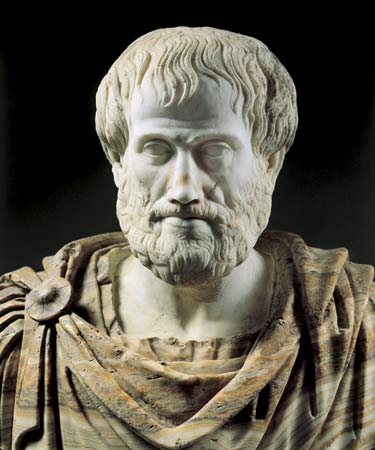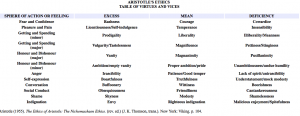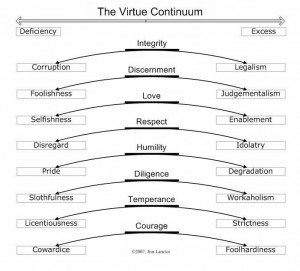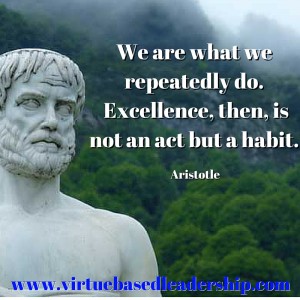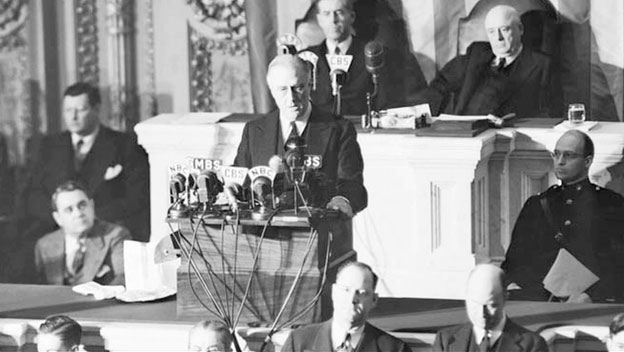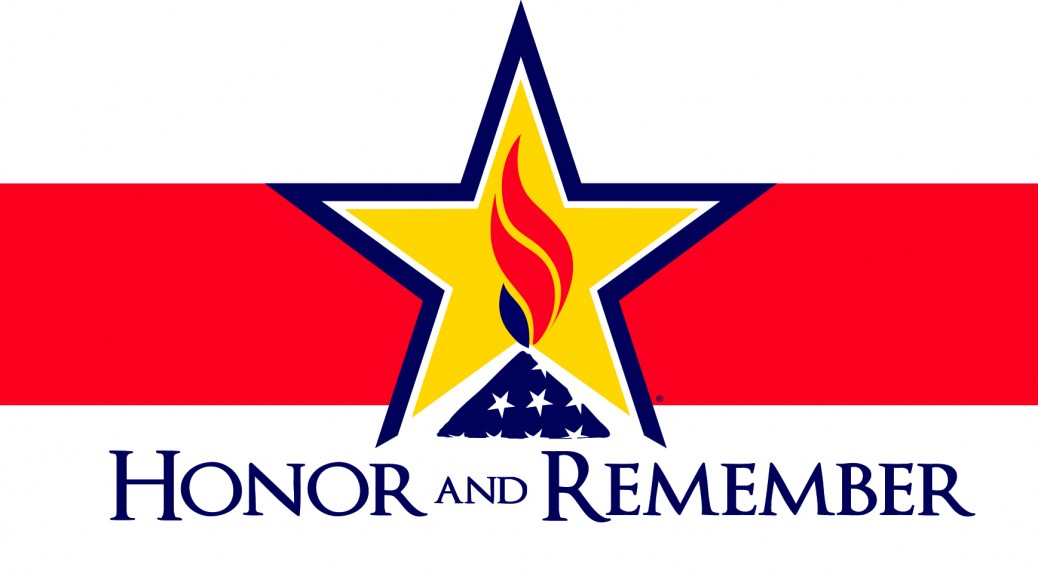Monthly Archives: January 2016
Is it Possible to Have Too Much Virtue?
Aristotle taught that virtue lay in the moderation within what he called “spheres of action,” or “spheres of feeling.” Courage, he said, was practiced in the sphere of fear and confidence, avoiding excesses or deficiencies of either, which would result instead in cowardice or rash action. Truthfulness lay in the sphere of self-expression, avoiding the vices of either boastfulness or false modesty. In the sphere of pleasure and pain, temperance was found between licentiousness and senselessness. (See figure below). In each case, virtue is found in the moderation of actions in a given sphere, while vices lay in either deficiency or excess of such actions.
Figure 1 (Credit: Central Washington University – click to magnify)
Another philosophy, illustrated by the following meme (Figure 2). currently circulating around the Internet, hints at Aristotle’s teachings, while oversimplifying and thus corrupting them. By eliminating the column Aristotle’s spheres, and instead relying only on a simplified spectrum of actions within those spheres, this philosophy forwards that we must practice moderation of the virtues themselves. So, the illustration provides, a lack of integrity would lead to corruption (I agree). However, it also infers that too much integrity leads to legalism.
Figure 2 (copyright Jim Lanctot)
It is here I must disagree on several levels, finding such an argument to be a misleading argument based in postmodern relativism.
Starting with the first line of the chart, “integrity” is not a moderation between corruption and legalism. Corruption certainly indicates a deficiency of integrity, but legalism by no means is a reliable indication of its excess. In fact, one can have a complete lack of integrity and still be legalistic (and simultaneously be corrupt). For proof, one need only watch a session of Congress in which individual representatives or Senators manipulate rules of order to benefit their own interests. And this is not new – witness the Pharisees and Saducees of Jesus’ time.
If we did want to find a sphere of action, perhaps “application of rules,” with corruption and legalism as its extremes, a more appropriate label for the median might be “discretion.”
Likewise, I argue that judgmentalism is not an excess of discernment, but an absence of mercy. To be sure, one need not have discernment at all to be judgmental! And does one really believe that “enabling” is an excess of love? Hardly – enabling behavior comes from a deficiency.
If we continue down the ladder, we will find similar arguments refuting the chart’s validity. Disregard and idolatry both deny respect for what is truly important. Pride and degradation (or false humility) live together, rather than across a spectrum. Sloth and overwork both involve disregard for virtuous priorities. Temperance may indeed lie between licentiousness and strictness (Aristotle said senselessness), but is meaningless without the context of the sphere of pleasure and pain. And similarly, foolhardiness is not excessive courage but excessive self-confidence.
Further, there can be no such thing, as forwarded by this philosophy, as an excess of virtue. Certainly not the virtues presented. Can you imagine a world with too much Integrity, discernment, love, respect, humility, diligence, temperance, or courage? Oh, if only that were the case!
Similarly, there can be no such thing as a healthy moderation of vice. If “moderation in all things” were indeed true, we would ask the FDA to prescribe minimum levels of arsenic in our drinking water rather than only maximums! Similarly, there is no healthy minimum level of corruption, foolishness, judmentalism, sloth, idolatry, legalism, or other such vices!
We should not practice moderation of either virtue or vice, but strive for the highest levels of the former and the elimination of the latter.
Excellence is Not an Act but a Habit
Mission: Develop Future Leaders
To paraphrase a good friend and wonderful leader-mentor, “All leaders are departing leaders.” By our very human nature, our time in any position of leadership is temporary, whether that span be in decades, years, months, days, or even minutes. Effective leaders understand this, and begin preparing for their departure as soon as, or even before, they take the reins.
Often, when we as leaders speak of “leaving our legacy,” we think about the accomplishments, changes, vision, or policies for which we will be remembered.
Yet policies, vision, changes, and even accomplishments can have a short life-span. Sometimes they are gone as soon as the leader departs, yet even when they last a relatively long time, they like the leader are temporary in nature.
The one legacy, however, that has the potential to stand the test of time is development the next generation of leaders. For this reason, the best and most memorable leaders with and for whom I’ve served have understood the importance of pouring their lives and experience into the leaders of the future.
In my faith we refer to this as “discipleship,” and in business we often call it “mentorship,” but regardless of the title, it is the development not just of followers, but of future leaders, by providing a virtuous example, investing ourselves in their lives, passing along our knowledge, skills, and values, and (most importantly), teaching them to do the same for the leaders who will follow them.
And I believe we must not simply develop “good” or “effective” leaders, but virtuous leaders. Leaders who are able to identify and discern what is right, and then have the moral fortitude to lead themselves and others in the pursuit of that right.
This process must begin with being virtuous leaders ourselves. This starts with a clear assessment of who we are through prayerful reflection, honest introspection, involvement with our own mentors, and feedback from our subordinates. Then continues, using all of these assets, to improve ourselves so that we can be virtuous role models for our followers, peers, and even superiors.
Virtuous leaders then must invest in the lives of our people – teaching knowledge, confronting and correcting problems, and training always. As the young leader’s abilities and character matures, we move to a more supportive and less directive role, but we must maintain our high level of engagement.
And, when the leader begins to stand on his or her own, we must also invest in perhaps the most important and most-often neglected skill: replication. The new leader must, through our example and our investment, learn to do likewise, to serve as an example and investor of virtuous leadership to the next generation.
It is only through this intensive engagement that we as leaders can create a true and lasting legacy.
Please join the conversation! Do you have a mentor who made a profound impact on your life? Have you passed on that impact to others? What do you think are the most important aspects of developing future leaders?
If You Could…
What is Virtue-Based Leadership?
Contemporary theories on leadership, including “Servant Leadership” and “Transformational Leadership,” focus upon the interaction of the leader, followers, and organization toward the accomplishment of a mission. And at first glance (or even after years of consideration), this makes sense, and has led to a vigorous debate as to which are the correct foci and which of these factors (leader, people, organization, and mission) should be take priority over the other.
Mission-oriented leadership theories and practices can be effective, allowing leaders to shape clear pathways towards specific and, ideally, measurable goals and objectives. Pure mission focus, however, often results in the neglect of the organization, and the people and resources comprising that organization.
Organization-focused leadership, on the other hand, excels in developing structures and procedures to accomplish the mission with the available people and resources. Efficient process is often the result, but often either (or both) the mission and people are neglected.
People-centric leadership concentrates upon the needs, capabilities, and development of those people making up the organization, with many contemporary theories including “Servant” and “Transformational” leadership championing the empowerment of those people to achieve their best. The danger here, of course, is the neglect of mission or organization in the interests of that achievement.
Perhaps the most dysfunctional, yet sadly most common, of all leadership practices are those which are leader-centric. For sure, it is important for the leader to embrace opportunities for self-improvement, development, or even fulfillment; however, the danger of prioritizing the leader is the slippery slope to selfishness and careerism.
Regardless of which of these priorities is set, the result often is not true leadership but manipulation, manipulation of the lower-priority entities to achieve the highest priorities. Thus, a mission-focused leader tends to find ways to manipulate people and organization to achieve the mission. A people-focused leader manipulates the mission and organization to help the people. An organization-focused leader manipulates people and mission. And a self-focused leader manipulates all three.
Nor is the answer a neo-situational leadership theory in which these four different priorities are selected and interchanged depending on the changing climate or situation. Even if perfectly-balanced, such a theory is only an ineffective bandage on a serious wound.
Instead, I would like to champion what I call Virtue-Based Leadership, asserting that the correct answer to the dilemma of prioritizing mission, people, organization, or leader is “none of the above.” Instead, true leadership can only occur when the leader starts with a foundation of virtue – the identification of what is right and noble, the establishment of that virtue as the ultimate goal, and the constant striving for that goal.
Thus, instead of focusing on the mission, the leader must first evaluate and define the mission on its virtues. Rather than focusing on the organization, the leader must first identify then apply the principles of virtue to its structure and ethics. Instead of focusing on the desires of the people, the leader must help set virtuous goals in their development and care. And, perhaps most importantly, the leader must strive for virtue in his or her own life and actions.
But what is that virtue, how is it discovered? That is another question for a future article!
Click here to learn more about the author.
Click here for upcoming speaking engagements or events.
Click here to learn more about arranging a talk, interview, article, or consultation on Virtue-Based Leadership.
Cowardice or Courage – It’s Our Call
“Our national security strategy, once a robust combination of diplomacy, information, military, and economy, has become one of ‘just do something…anything,’ in which we believe any problem can be solved with a sprinkling of drones, bombs, or boots. We simply cannot sustain this accelerating expenditure of blood and treasure.”
In recent years, our country has become embroiled in many wars, most of them not authorized by Congress as required by Article I of The Constitution. In fact, the last authorizations for the use of military force (AUMF – what we have substituted for a formal declaration of war) were for Iraq and Afghanistan, issued under the administration of President George W. Bush.
President Obama has cited both AUMF 2001 (Public Law 107-40, directed at those who committed the 9/11 attacks, and which authorized the invasion of Afghanistan) and AUMF 2002 (Public Law 107-243, authorizing force against Iraq) as his justification for his use of military force throughout the Middle East, and specifically in Iraq and Syria against Daesh (also known as ISIL/ISIS).
The problem is that that neither of those AUMFs are valid for such action.
AUMF 2001 specifically authorizes force against “nations, organizations, or persons he determines planned, authorized, committed, or aided the terrorist attacks that occurred on September 11, 2001, or harbored such organizations or persons.” Daesh, an organization which did not exist prior to 2013, does not fall under such authority.
AUMF 2002, on the other hand, had as its scope the now-defunct government of Iraq under Saddam Hussein and the terrorist organizations that government supported, and was limited to the confines of Iraq.
So, just like his war in Libya, President Obama’s war in Syria and Northern Iraq is illegal under The Constitution.
You might ask why this matters. Shouldn’t President Obama, in his role as Commander-in-Chief, address the threats represented by Daesh?
Yes, he should. However, The Constitution is full of brilliant checks and balances between the three branches of government, and one such system of checks and balances is between the Legislative and Executive branches when it comes to waging war. In short, when the President as the Head of State determines that a threat to our national security and/or interests exists that warrants the use of military force, it is his responsibility to request authorization from Congress to use that force. It is then Congress’ responsibility to evaluate the request, debate it, to authorize such force, and to initiate legislation to authorize expenditures to support the war. Finally, the President, in his role as Commander-in-Chief and under authorization from Congress, executes the war.
Of course, some time-critical events especially in this era of rapid decision cycles preclude the President from seeking such authorization; yet even in these situations, it is the President’s legal responsibility (under the War Powers Resolution, 50 USC 1541-1548) to inform Congress within 48 hours and to gain authorization for continued military operations.
In the absence of such authorization, whether pre-emptive or reactive, the President must withdraw all forces within 90 days.
Again, you may ask why it is important for these laws to be followed. I present three reasons.
First, we are a nation of laws. That is the definition of a republic. If we allow our leaders to ignore those laws, we risk either anarchy or dictatorship.
Second, by not holding our elected representatives to the clearly-defined requirements of The Constitution and applicable laws, we have created a vicious cycle of continuous and indiscriminate war. In the past 25 years since our 1991 war in Iraq and Kuwait, we have committed combat forces to a dizzying number of places around the globe: Zaire, Sierra Leone, Bosnia, Somalia, Macedonia, Haiti, Liberia, Central African Republic, Albania, Congo, Gabon, Cambodia, Guinea-Bassau, Kenya, Tanzania, Afghanistan, Sudan, East Timor, Serbia, Kosovo, Nigeria, Yemen, Cote d’Ivoire, Georgia, Djibouti, Pakistan, Lebanon, Libya, Uganda, Jordan, Chad, Mali, Syria, and so many other places not even known, as well as the seas between them and the air and space above. Most of these wars have been unauthorized, and with each of them, the ability of the President to commit our forces unilaterally, without any checking or balancing of his powers, has become easier and more frequent. Our national security strategy, once a robust combination of diplomacy, information, military, and economy, has become one of “just do something…anything,” in which we believe any problem can be solved with a sprinkling of drones, bombs, or boots. We simply cannot sustain this accelerating expenditure of blood and treasure.
Third, our aversion to making the tough decisions either to declare (or at least authorize) wars or not has led to an increasingly-wide gulf between our military at war and our populace at peace. Without any requirement to convince Congress to support our wars, the President has not had to express his reasons or strategy to the nation. The absence of such communication, combined with our habit of spending ethereal borrowed money on military operations and the consequential expenses, allows the wars to continue without any sacrifice in the form of taxation or program cuts. The citizenry thus remains blissfully insulated, ignorant, and detached from the sacrifices made by our forces. And the ultimate consequences of this include an angst and bitterness in our returning combat veterans, directly contributing to their obscene rate of PTSD and even suicide.
For this reason, I have been urging Congress to declare our illegal wars in Syria, Iraq, and elsewhere. Often, this endeavor has felt as if I am tilting at windmills, and I must confess to having gained little traction, or even an audience, with either my Representative (Annie Kuster) or senior Senator (Jeanne Shaheen). I have had some interaction and discussion with Senator Kelly Ayotte and her staff, but despite the pro-military credentials she trumpets, and some promises to visit the subject, she has not taken action.
“The silence of Congress in the midst of this war is cowardly and shameful…this Congress, the very body that is so quick to argue against President Obama’s use of executive power… allows an executive war to go on undeclared, unapproved, undefined and unchecked.” – Sen Kaine (D-VA)
In the words of Senator Tim Kaine (D-VA), “The silence of Congress in the midst of this war is cowardly and shameful…this Congress, the very body that is so quick to argue against President Obama’s use of executive power… allows an executive war to go on undeclared, unapproved, undefined and unchecked.”
But perhaps, if you and others join me in this Quixotic venture, we might begin to make enough noise that would cause our Congress and President to act. So, I am asking you to do so, to spread this message, and to hold your representatives’ feet to the flame. I’d also appreciate any ideas you may have in ways we can do this. Feel free to contact me, or post your thoughts below.
Please click here to learn more about the author.
Thought for the Day
Gold Star Families of NH Speech
[Note: The speech above was given in 2013 to an event honoring Gold Star families in New Hampshire while I was still on active duty]
Thank you Gold Star families, for your sacrifice, the sacrifice that so few understand or comprehend.
And let’s thank God for blessing us with the gift of heroes, who have risked all and given all in the service of this country and its blessings, which themselves are a blessing from God.
In the news we are hearing talk about some nonsense that military members are not allowed to speak on matters of faith.
Balderdash.
I’m thankful that the Pentagon has clarified this, that there is a difference between forced proselytizing – trying to coerce someone into accepting your religion – and honest dialogue or even evangelism.
It is impossible for anyone, and definitely impossible for me, to speak honestly from the heart and NOT express one’s faith in the process. That’s true whether you are a Christian, a Jew, a Muslim, a Budhist, a Confucian, an agnostic or an atheist. If you speak what you believe to be true, isn’t that speaking about your faith?
And if you refuse to speak about what you believe to be true, what would we call that?
In fact, like the heroes no longer with us, I was required to memorize the Code of Conduct of the United States Fighting Force, a code to which I am legally bound, which starts with:
I am an American, fighting in the forces which defend my country and our way of life. I am prepared to give my life in their defense.
And closes thus:
I will never forget that I am an American, fighting for freedom, responsible for my actions, and dedicated to the principles which made my country free. I will trust in my GOD and in the United States of America.
And I want to speak in truth and honesty to you today, and because of that, I’m going to have bring my faith into it. Perhaps that is because the value of sacrifice is so central to my faith.
And as you know all too well, it is our Gold Star families who define sacrifice in the world today.
Your loved ones took that Code of Conduct to its ultimate end, giving their lives in the defense of their country and our way of life. When the trumpet called, they answered. When the attack came, they advanced to the sound of gunfire. When all hell broke loose, they were there to put it back in shackles. And in the end, they gave their lives so that others might live.
And for that, we honor them. And we honor you also, the families of these warriors, who have sacrificed so much.
In fact, in my faith, it is Abraham, not Isaac, who is remembered as the honored for his sacrifice. Because he was willing to put his beloved son on the altar.
And in my faith, I believe that God chose to use sacrifice as defining aspect of His character, so much so that He sacrificed His own Son to be tortured and hung on a cross so that we could be reconciled to Him. He gave up his best to be killed for a world that didn’t deserve it, a world where many continue to fail to appreciate that sacrifice.
And that aspect of His character, the character of the God I serve, is what I see in you, the Gold Star families here today.
Because sacrifice is what military families have done and continue to do every day.
Because in a time where the military has gone to war while America has gone to the mall, a time where some have given all while most have neither been asked, nor volunteered to sacrifice more than putting a “support the troops” magnet on their trunk, you have sacrificed dearly.
Because while we in the military serve. You sacrifice.
We strap on a jet, or shoulder a ruck and rifle, or sail on a ship, or do a thousand other things that we are called to do as not only our duty but our passion. That is service.
But what YOU do and have done is sacrifice.
Military families sacrifice every time their loved one walks out the door.
…every time a ship sails.
…every time an aircraft takes off.
…every time your loved one says, “I have to go.”
…every time you say goodbye, whether in person, or on the phone, or on Skype.
…every time a staff car drives into the neighborhood and you say, “Please, don’t stop here.”
…every time a notification team walks up to a door.
…and in the days, months, and years afterwards, our Gold Star families continue to bear the burden of that sacrifice.
We serve. You have sacrificed. And in a country that sometimes seems not to understand or value that sacrifice deeply enough, we are here today to honor you.
To tell you that when the honor guardsman handed you that folded flag and said, “On behalf of a grateful nation,” those words were not empty.
To tell you that though some are too caught up in their own selfish needs and pursuits, that we honor your loved ones who gave all in service to things so much greater than themselves, and that we honor you, not just for allowing them to serve, but raising them, growing them, encouraging them, and molding them into the brave men and women they were, driven to serve things greater than themselves.
To tell you that, in the words of Hub McCann, there are some things worth believing in. “…That honor, courage, and virtue mean everything; that power and money, money and power mean nothing; that good always triumphs over evil… that love… true love never dies.”
To remind ourselves that just as your sacrifice continues every day, our support for you needs to continue every day. Whether that support is s phone call, or stopping by to watch the kids, to bring a meal, help with an errand, or to pray, or just to stop and sit with you.
As I prepared to talk to you today, I reached out to Gold Star families I know personally, and I want to pass along words from two amazing women, whose husbands died in service to our country.
Tami, whose husband Dee died last year in Southwest Asia, asked me to pass this to you, our Gold Star families:
You are as much a hero as your loved one lost. Know that it may seem that people forget. In general when events like this happen the people around you get to choose how much they are going to allow the event to affect them–you don’t get to choose. Know in your heart that everything that happened matters–your loved one matters (not mattered)…You are not alone! You have good friends (some whose relationship blossoms after the event), you have family (though you will see that the relationship with your family has changed too), but most of all you have people who are on the same walk as you. Embrace those who have been there–use their support and tell them your darkest thoughts that you need to get out. These are the people who have thought that too and can tell you how they have gotten through it. Know that God is good and choosing JOY is a difficult decision (usually the more difficult one) but it is worth it.
Leigh, who lost her husband Nick over three years ago added this:
Also, know that you are not alone in this. There are many that are walking the same journey as you, and we are for you, to encourage you and let you know it will be okay…because it will. I have walked this journey for 3 1/2 years with two very young children. It’s not always easy, but God has truly blessed our lives and has been amazing in his provisions for our “new” life.
And to those of us who support Gold Star families, they both asked us to remember that the sacrifice continues well past the time that most of the immediate assistance ends. Take the time to reach out, whether they are next door or across the country. Remember that, though wounds heal over time, the loss remains.
Nick and Dee were good friends of mine, warriors like your loved ones who chose to serve in one of the most challenging times of our nation’s history. Like your loved ones, they lived the code and never gave up the faith, and we owe it to them never to give up our support for you, and our honor both for their lives and your sacrifice.
I’d like to close with words from a much greater leader than me to a mother who lost her sons in war. His words are more eloquent, and his burden of leadership greater than any I have carried.
“I feel how weak and fruitless must be any word of mine which should attempt to beguile you from the grief of a loss so overwhelming. But I cannot refrain from tendering you the consolation that may be found in the thanks of the Republic they died to save.
I pray that our Heavenly Father may assuage the anguish of your bereavement, and leave you only the cherished memory of the loved and lost, and the solemn pride that must be yours to have laid so costly a sacrifice upon the altar of freedom.
Yours, very sincerely and respectfully,
Abraham Lincoln”
May God hold you in His comforting hands
May God spur us into action to support you
And may God continue to bless the United States of America.
Note: The speech above was given in 2013 to an event honoring Gold Star families in New Hampshire while I was still on active duty.
Click here to learn more about the author
Click here for upcoming events

